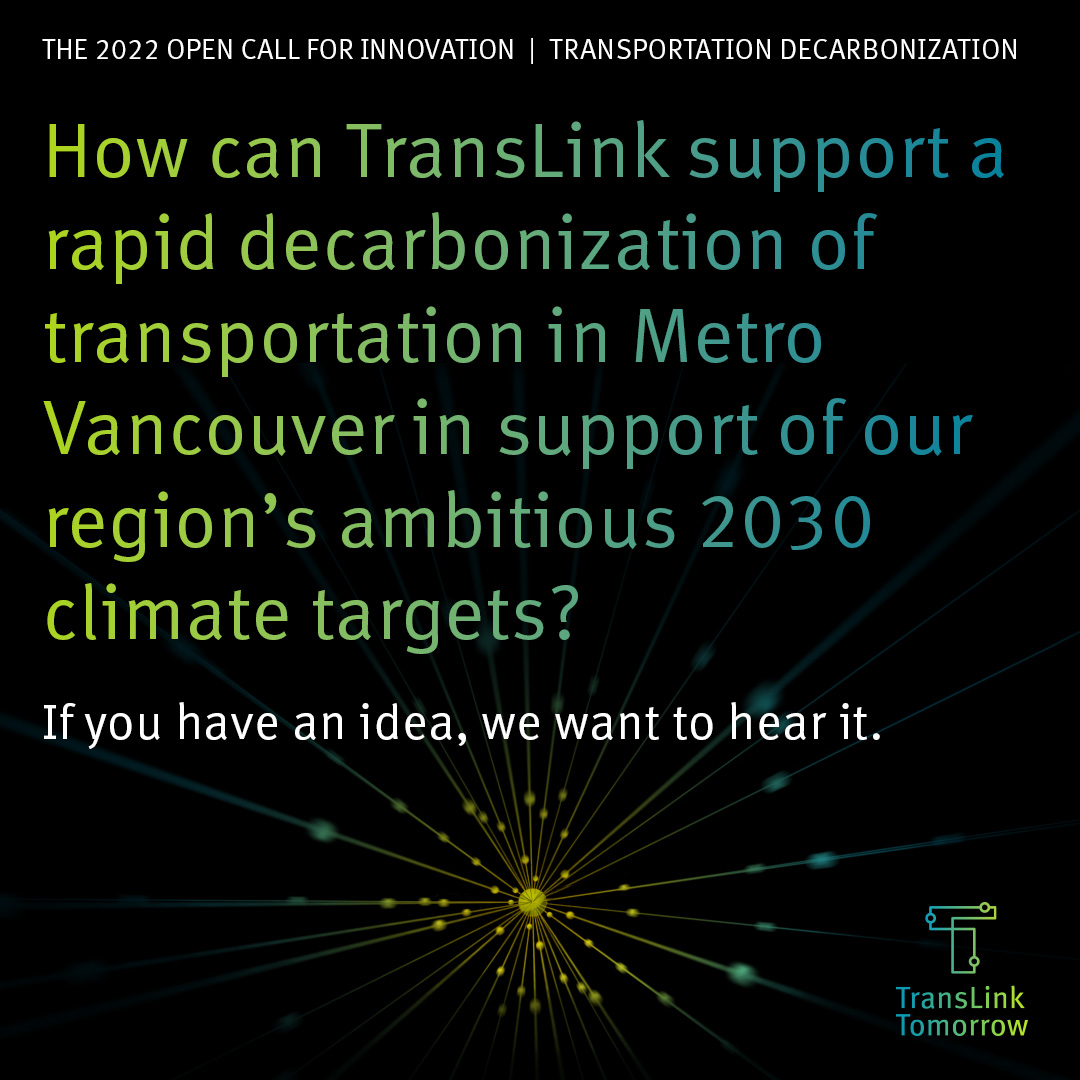Last chance to answer TransLink Tomorrow’s Open Call for Innovation
Last chance to answer TransLink Tomorrow’s Open Call for Innovation
TransLink Tomorrow is calling all innovators and entrepreneurs for their creative solutions to tackling Transportation Decarbonization as part of our annual Open Call for Innovation. This is your last chance to submit your idea as the submission period closes on Sept. 30.
is calling all innovators and entrepreneurs for their creative solutions to tackling Transportation Decarbonization as part of our annual Open Call for Innovation. This is your last chance to submit your idea as the submission period closes on Sept. 30.
We want to hear from anyone and everyone for their ideas on how to rapidly reduce the amount of greenhouse gases emitted by transportation in Metro Vancouver. To stimulate grass-roots innovation in the new mobility field, TransLink encourages tech start-ups and non-profit organizations to submit.
The Open Call for Innovation is looking for creative proposals that include electrification, renewable fuels, carbon capture for fleets, zero-carbon energy storage solutions, and any other innovative ideas that step up and answer the challenge statement.
Challenge Statement
How can TransLink support a rapid decarbonization of transportation in Metro Vancouver in support of our region’s ambitious 2030 climate targets?
For more information, please visit translink.ca/opencall, or read the information package and terms and conditions. Register for an account on TransLink Tomorrow’s Planbox platform to submit your idea by Sept. 30.
If selected, we’ll work with the you to fund, incubate, and implement your idea. Giving you exclusive, insider access to TransLink supports to test or demonstrate the idea, along with the opportunity to pilot the idea on a larger scale in partnership with us.
Previous Open Call for Innovation partnerships:
In its inaugural year, TransLink partnered with Modo, Mobi by Shaw Go, and Evo Car Share for the Shared Mobility Pilot Program. It tested the user experience and technical integration of tying multimodal journeys together with a Shared Mobility Compass Card over an 11-month period.
In 2021, TransLink partnered with Transit app to trial exclusive capacity predictions on buses giving customers the ability to ride with confidence and comfort. Predictions generated by the app are based on historical trends and Automated Passenger Counter (APC) data collected from TransLink’s bus network. Providing bus capacity predictions allows customers to see if there is room to ride on a bus before boarding.
So, what’s next? It could be your innovative idea!
Why transportation decarbonization matters
Tackling the climate emergency is a global collective and collaborative effort, so we want to work with you.
The United Nations has said “our window to avoid climate catastrophe is closing rapidly.” The Paris Agreement set the goal to limit global warming to well below 2° Celsius compared to pre-industrial levels.
As planners of the regional transportation system, TransLink plays a critical role in addressing the climate emergency.
We have mapped an aggressive path to zero greenhouse gas emissions (GHGs) as part of our Climate Action Strategy adopted in 2022. It sets out how we will move to net-zero GHGs and build a more climate-resilient transit system by 2050. We have also adopted Transport 2050, the regional transportation strategy, and are working on a Regional Transportation Climate Action Plan.
Today, we operate one of the largest all-electric fleets in Canada and the United States. The SkyTrain system is powered by electricity, and we are the only system in Canada that operates trolley-electric buses. We also currently have four battery-electric buses in our fleet with 15 additional buses on the way.
So, when more people take transit, walk, or bike instead of driving, they are taking one of the biggest steps to shrinking their carbon footprint.
But we’re eager to collaborate with you to do more to help achieve the region’s ambitious climate goals and do our part as global citizens.
TransLink Tomorrow is our commitment to continuously explore, test, and implement innovative ways to improve mobility in Metro Vancouver.





